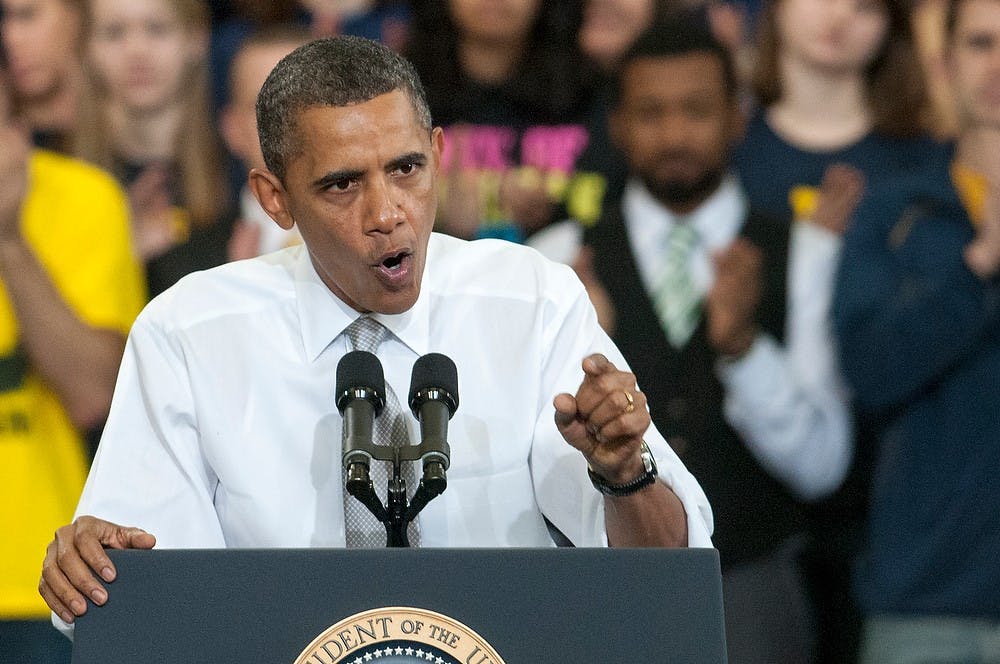And when media outlets called Ohio for the president around 11:15 p.m., it was over; Obama had received more than the 270 electoral votes needed to secure his re-election and permanent place in history — America’s first black president, re-affirmed.
Unlike four years ago, when he was elected on a wave of hope and change, Obama’s path to victory started slowly and surged late, prompting questions of how certain a second Obama term would be and if former Massachusetts Gov. Romney, a Michigan native, could oust him.
But MSU experts said a Romney victory was unlikely from the beginning.
Robert Kolt, an instructor in the Advertising, Public Relations and Retailing Department in the College of Communication Arts and Sciences, said Romney’s only chance at winning the necessary 270 electoral votes was for him to win a key Midwestern state, such as Ohio or Wisconsin, or even managing a surprise win in Michigan.
In the end, Romney couldn’t quite hold on.
As results poured in throughout the night, his early lead slipped away, but not without a bitter fight for essential swing states, Ohio and Florida.
Kolt said there was a limited competitive election cycle in Michigan, especially after Romney barely won the Michigan primary in February, which translated into disbelief that Romney would be a serious threat to Obama.
“People had probably not expected that we would have a good race earlier in the year,” Kolt said. “It turned out to be the exact opposite.”
The count
Early in the night, Romney took the lead in the southern and central states, while Obama led both the East and West coasts, as expected.
Obama launched a comeback after results in West Coast states were available, and pulled away from Romney in the last few crucial swing states of Wisconsin and Ohio.
Although Obama won the electoral votes, he was just behind Romney in the popular vote at the time the race was called, 50 to 49 percent.
Doug Roberts, director for the Institute for Public Policy and Social Research, said a Romney win would necessitate him carrying Florida and Ohio, which he could not deliver.
Other states farther west already were decided for either candidate well in advance, Roberts said, leading to a narrow Obama victory.
MSU political science professor Saundra Schneider said it also was unlikely that East Coast results would change, despite widespread destruction from Superstorm Sandy last week; there would be few dramatic effects on the presidential race other than fewer people turning up to the polls, she said.
New York and New Jersey, the two states hit hardest by the storm, typically are Democratic-leaning to begin with, Schneider said, and how Obama handled the storm there likely aided his campaign.
A sitting president with government resources can use his position to demonstrate leadership, sympathy and preparedness in times of crisis, Schneider said.
“(Obama) was in a position to do that,” she said. “Romney was not.”
The mitten
Both the Obama and Romney campaigns have been relatively uninvolved in Michigan, despite initial emphasis that Michigan was essential to winning the presidency.
Support student media!
Please consider donating to The State News and help fund the future of journalism.
During the party conventions in August and September, the campaigns repeatedly touted Michigan’s importance in the road to the White House, both giving Michigan delegates prime locations in the arenas to officially nominate their choice for president.
Romney often referred to his Michigan connection, priding himself on being a former governor’s son and growing up outside of Detroit.
Romney Deputy Campaign Manager Katie Gage said in a previous interview the race for Michigan is always important, especially since he is a native son.
“It’s the place where Mitt spent the first 20 years of his life,” she said. “He has a strong connection there.”
Gage said Michigan’s electoral significance was much different this year than in 2008, when GOP candidate John McCain pulled his resources out of Michigan months before the election, which left the volunteer supporters and the Michigan Republican Party “a little depressed.”
But Kolt said Romney depended too much on connecting with Michigan voters, and after it was clear support for Romney would not materialize, he appeared to vote off the state.
At press time, Michigan continued its blue streak at the polls Tuesday night, as 53 percent of Michigan voters chose Obama to serve a second term as president.
Just before midnight, about 68 percent of Ingham County voters chose Obama for a second term, and 31 percent voted for Romney.
Kirstin Alvanitakis, communications director for the Michigan Democratic Party, said Obama consistently has been ahead by a few percentage points, but Tuesday’s election did not compare to Obama’s 2008 landslide victory, when media outlets called the race early in the night.
Still, Obama has been ahead in statistical forecast models and polls for several weeks, gaining momentum in the predicted electoral results.
Graduate student Matas Tamosiunas, who is from Chicago, said he has admired Obama for years.
“I voted for him when he was an asterisk on the ballot in Illinois, and now he’s getting his second term as president, so it’s somewhat surreal,” he said.
Discussion
Share and discuss “Fourward” on social media.







